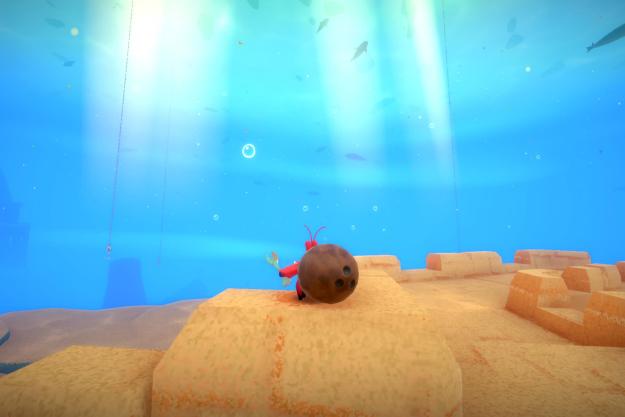
Riddick writer/director David Twohy isn’t a guy you want to bump into in a dark alley. He’s got some dark impulses, as his continued work with interstellar bad dude Richard B. Riddick demonstrates. Twohy freely admits that he put some of himself into the character as Riddick came together.
“When I’m sitting down and writing him, I get to unleash my monsters,” he tells Digital Trends. “I get to unleash my antisocial, asocial behavior and just get it out of my system. He represents my dark side as well as [Riddick star Vin Diesel’s]. He’s great for me too.”
Twohy chuckles at the thought, but he’s on to something here. There’s a very primal appeal to Riddick as a character; he feels more like an unstoppable force of nature than a mere tough guy. That’s not quite accurate though. Natural forces ebb and flow according to universal laws. There’s no thought to a raging storm; it simply happens. Riddick, on the other hand, rarely acts without thinking. He’s not quite compassionate, but he’s not overtly sociopathic either.
“[‘Riddick’] was just me with Vin in his kitchen coming up with a verbal gameplan…”
“He is a killer with a code, and that’s more important to us than a killer with any kind of compassion. Sometimes he has no compassion; survival is paramount within him,” Twohy explains. It’s that aspect of the character that led to the recently released Riddick‘s script changing in one particular scene.
The script originally had Riddick sneaking into a bounty hunter camp and killing one of the mercs in kill blood. After a brief dialogue exchange, Riddick was supposed to jam a knife into the merc’s brain. That creative decision didn’t fly with the star, who has been inhabiting this character since 1999’s Pitch Black. He knows Riddick better than anyone, and that particular moment seemed out of character.
“Vin was balking at that [scene], and when we finally talked it out he said it was because this guy didn’t really do anything to [Riddick]. He’s a good soldier among his rank-and-file. If he came after Riddick, sure. But Riddick going to him, into his space, and then just assassinating him in the shadows just doesn’t feel right.”
The level of input that Diesel has now versus back in 1999 when Pitch Black first came together is dramatically different. Riddick is the third movie in Twohy’s series, picking up where the story in 2004’s The Chronicles of Riddick left off. Diesel’s involvement escalated with each successive release in the series (video games and other spin-offs included). He even waived his fee for appearing in The Fast and the Furious: Tokyo Drift in exchange for the Riddick rights.

“The first movie, he was just an actor to me. The best available actor that I cast,” Twohy says. “The second movie he became a producer as well because he had The Fast and the Furious under his belt at the time. He was a different animal, and our relationship had to change by necessity. Then the third movie, because we are both co-owners of the movie and were raising money independently, he becomes my co-conspirator. That’s what I call him now.”
Riddick’s path from concept to finished product is an unusual one. Twohy and Diesel teamed up early on in the process to seek independent financing for the new movie after Universal made it clear that it was out of the Riddick business. For Twohy, it was sort of like returning to that time in the late ‘90s when he was struggling to get another Riddick movie made.
“Pitch Black was an independent movie too. We were orphaned by our financiers at the time [after they] went bankrupt,” Twohy says. “We barely had enough money to finish. There was a moment in time when it looked like Pitch Black might go straight to video. Which was, at the time, death for a movie.”
“But then somebody at Universal saw it and went, ‘Wait a second. We can make some money on this.’ So they threw it into theaters. That was really a game-changer for us. The second [film] was a big studio movie all the way, developed in-house.”
“There’s probably two movies left in the franchise before we wrap it up…”
Unfortunately, The Chronicles of Riddick failed to find an audience when it released in 2004. It wasn’t a total bust, box office-wise, but it wasn’t the sort of success that Universal needed to see to justify taking the franchise further. So once again, Twohy found himself working to find independent financing for a sci-fi movie about a dangerous fellow named Riddick.
“[Riddick] was just me with Vin in his kitchen coming up with a verbal gameplan,” Twohy says. The two developed the story together, after which Twohy wrote a spec script that he then successfully sold at the Berlin Film Festival. When he came back to the States to find a U.S. distributor, the unlikeliest of candidates stepped up.
“[We were] looking around for a domestic partner knowing that Universal had said no, they’re out of the Riddick business. And then, surprise surprise, Universal [gets in touch] and says, ‘How about us? We’ll distribute the movie.’ We said, ‘Are you crazy?’ And they said, ‘Yeah, but it’s a crazy business. Come on back!’ So, strangely, it was Universal again.”
In many ways, Riddick feels like a bigger movie than Chronicles. The scope of the 2004 effort covered a wider swath of territory, but the stakes in Riddick’s more personal survival story fit the character well. Part of the success comes from Twohy and Diesel’s creative approach, which is a process of paring down rather than building up.
“We always overreach initially,” Twohy says. “We always think grand thoughts. But those are tamped down by the reality of how much money we’re going to be raising to make the movie. So there’s a very practical discussion to be had alongside our grandiose story discussions. Early on, anything is possible. We were going to multiple worlds and fighting legions of the undead and things like that. Then after awhile, reality has to set in by the time I sit down to write.”

“We both liked this very isolated, insular survival story along the lines of Castaway or Jeremiah Johnson. We like the starkness of it. So we both gravitated to that. Then I said, ‘Let’s not forget about Pitch Black either. Let’s tie it in with one guy searching for answers about his son. That’ll be a very personal quest. I think that’ll give a nice heartbeat to the story.’ And then you just build it from there and integrate the existing mythology.”
The existing mythology that Twohy refers to is the thread tying together not just these three movies, but the multimedia universe that includes two video games, an animated feature, and a motion comic. He and Diesel have an elaborate big picture plan for Riddick, one that leads into some sort of intergalactic underworld and then, eventually, to the planet of Furya.
“There’s probably two movies left in the franchise before we wrap it up,” Twohy says of what’s ahead for Riddick. “I don’t think it should be an open-ended franchise like some are. One may well lead us into the Underverse. The supposition is that you have to go through the Underverse to get to [Riddick’s] homeland, Furya, and then set that world right. That’s kind of what’s in our heads right now. I’m building those out as we speak.”
(Images © Universal Studios. All rights reserved.)


